Sustainable Farming

Overview
Through integrated farm management solutions, we contribute to global food security by delivering 15-30% higher productivity, 10-15% increased profitability, 15% Green House Gas (GHG) emissions reductions, and 20% more efficient water and fertilizer use, while protecting natural resources and supporting sustainable livelihoods for smallholder farmers.
Our work integrates agronomic practices, plant health innovations, and farming-system approaches. It is co-developed and co-delivered with National Agricultural Research and Extension Systems (NARES), governments, private sector, advanced research institutions (ARIs), non-government organizations (NGOs), farmers, and civil society, prioritizing women and youth in low-and middle-income countries (LMICs).
We are scaling equitable public goods to build resilient farming systems, equipping stakeholders to overcome shocks, constraints, and risks for transformative impact.
Our goals
Our work will contribute to
Where we work
Tier 1: Ethiopia, Burkina Faso, Malawi, Burundi, Kenya, Nigeria and Rwanda.
Tier 2: Tanzania, Bangladesh, DRC, Egypt, Uganda, India, Zambia, Vietnam and Ghana.
Tier 3: Mozambique, Madagascar, Philippines and Morocco.
Challenges
Challenges we’ll address:
- Need to increase nutritious food production by 60% to meet expanding population demands
- 20-40% reduced agricultural productivity growth because of climate change
- An agricultural environmental footprint equivalent to 1/3 of annual greenhouse emissions
- Persistent social inequities and an aging agricultural labor force
- Exclusion of youth, women, and marginalized communities in agricultural production
Areas of work
Accelerating digital and AI-enabled farm advisory at scale
Transforming traditional advisory services by delivering accurate, localized, and inclusive guidance through digital and AI tools, grounded in robust agronomic data and validated standards to drive adoption and impact for smallholders.
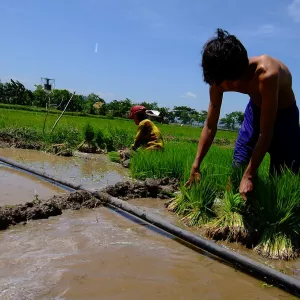
Enabling preparedness and rapid response to emerging shocks
Strengthening capacity to anticipate, detect early, and interpret climate, pest, and disease threats, localizing risks into actionable farm-level intelligence with enhanced early warning systems and co-created response strategies.
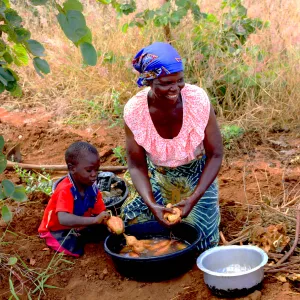
Delivering integrated solutions to systemic farm-level binding constraints
Addressing interconnected biophysical and socio-economic pressures like soil health and plant diseases through systematic diagnosis, co-developed farm management solutions, and scaling via inclusive partnerships.
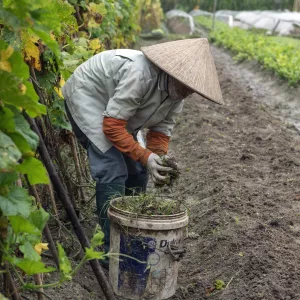
Incubating innovation in sustainable farming
Acting as an internal incubation fund to de-risk high-potential ideas, catalyzing frontier research and technologies to build disruptive prototypes that advance other areas of work.

Accelerating impact
Providing foundational support through standardized Findable, Accessible, Interoperable, and Reusable (FAIR) and AI-ready data, consistent Monitoring, Evaluation, Learning, and Impact Assessment (MELIA) tools, and partnership platforms to enable scaled implementation and policy influence.
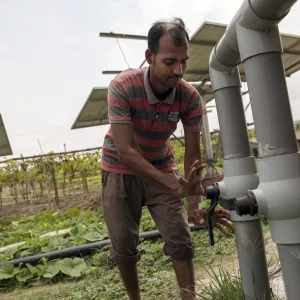
Gender Equality & Social Inclusion
We address gender and social inequalities in agri-food systems through an inclusive, gender-responsive approach integrated across all areas of work. This ensures equitable interventions that close knowledge gaps, bundle innovations effectively, and drive sustainable, farmer-responsive impact.
Our approach
Interlinked support across CGIAR’s portfolio
We will work closely with the Better Diets & Nutrition, Breeding for Tomorrow, Climate Action, Genebanks, Multifunctional Landscapes, Policy Innovations, Scaling for Impact, Sustainable Animal and Aquatic Foods programs, and the Capacity Sharing, Digital Transformation, and Gender Equality and Inclusion accelerators.
Working to share our capacity with
- Governments and Policymakers
- Private sector
- Scientists and research institutions
Our expertise
- A strong capacity and experience in organizing and coordinating an international program around the future sustainability of agricultural systems
- A diverse and global expert pool of agronomists, soil scientists, plant health specialists, desert farming specialists, crop modelers, data scientists, policy scientists, and co-creation and gender experts
- Extensive, locally embedded physical resources within our centers, including research stations, field sites, laboratories, germplasm health units, manufacturing facilities, and long-term experiments
- Solutions and innovations tailored to local contexts while considering broader agricultural development goals
Events
News
-

Reclaiming the Banana Island: How Ukerewe Farmers Are Restoring Production After Bunchy Top
Banana production on Ukerewe Island collapsed after Banana Bunchy Top Disease infected more than 85% of plants, driven by infected planting material...
-
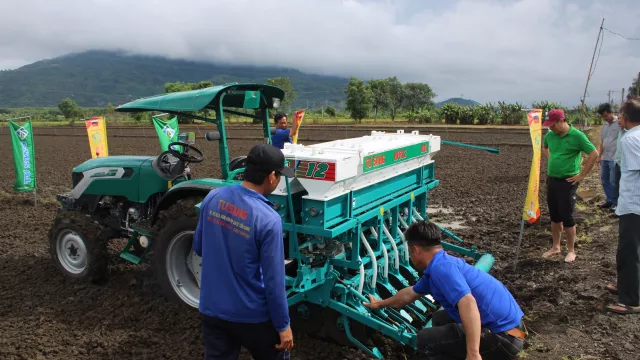
Innovative Direct Seeded Rice Tech Debuts in Vietnam
IRRI and local partners in Dong Nai, Vietnam, debuted an innovative all-in-one machine for mechanized dry direct seeding and deep fertilizer...
-

How Ethiopia’s indigenous plant secures the future
What if food and feed could grow continuously, be harvested at any time of year, and provide both protein and energy from a single plant?
-

Women and youth-led feed enterprises building resilience
The resilience of integrated farming systems relies on keeping essential links among their components. In Ethiopia's Doyogena district, the most...


